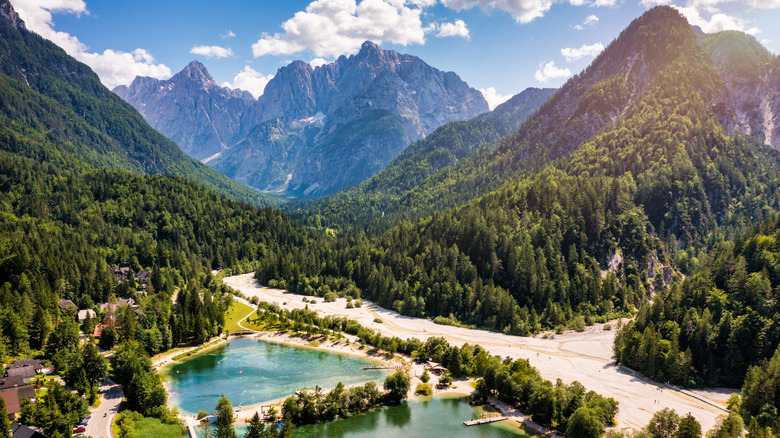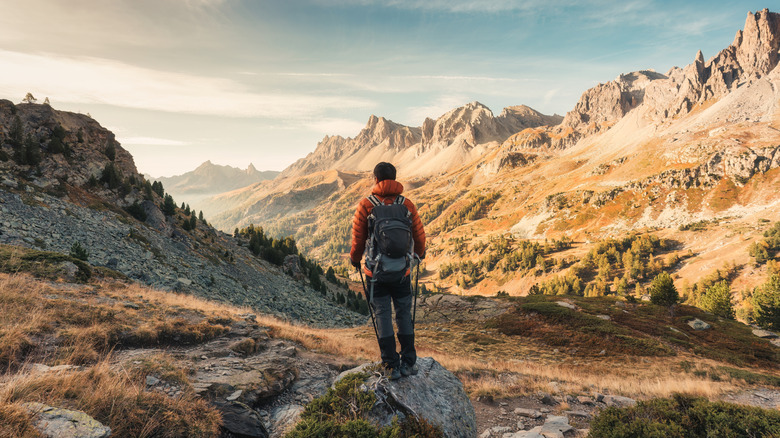One Of Europe's Most Beautiful Tourist Destinations Has Some Of The Cheapest Accommodation
The Alps rarely have any competitors when it comes to their sheer natural beauty. Stretching from the Mediterranean shore to encompass eight disparate countries — France, Monaco, Italy, Switzerland, Liechtenstein, Austria, Germany, and Slovenia — the Alps define much of the geography and climate of Europe. The Alps region stretches more than 750 miles and is inhabited by nearly 14 million people. Plus, the areas thick network of hiking paths, range of ecosystems, and eye-catching, dramatic tops such as Mont Blanc (15,783 feet, as of 2023, per the BBC) draws visitors looking for adventure as well as a bargain.
In fact, not many destinations can guarantee such a range of affordable accommodations as the Alps. You can find everything from mountain huts to comfortable backpacking hostels throughout the Alps region. Travel expert Rick Steves calls hiking the Alps one of the best travel values in Europe, since the region offers nearly free access to views you will never forget.
With that said, tourism in the Alps is showing continuous growth, according to the Q1 2025 report by the European Travel Commission, which recorded growing arrivals and overnight stays in winter destinations like Italy, Austria, and Switzerland. Plus, the Alps present a novel getaway from the usual European tourist trap you might prefer to avoid.
Best budget stays for hikers in the Alps
Budget accommodation options such as mountain huts, hostels, and guesthouses are available for hikers in the Alps and are located along many of the main trails. Rates are determined by the region and altitude but are still affordable. In Austria and the Italian Dolomites, hut beds alone in dorm settings cost between about $68 to $90 per night, according to Moon and Honey Travel. In Switzerland, prices for Swiss Alpine Club huts range from around $30 to $55 per night, according to MySwitzerland.com. French Alpine huts cost similarly, with fees from about $23 to $74, as reported by TheLocal.com. Slovenian huts tend to be the most affordable, with starting prices around $17 to $45, according to HikingSlovenianAlps.com. Remember that paying in the local currency, and not in U.S. dollars, can help prevent additional charges from unfavorable exchange rates.
Alpine clubs, like the Swiss Alpine Club or the Austrian Alpine Club, run networks of mountain huts geared towards hikers. Members often pay anywhere from 5% to 50% less on nightly fees. Because these clubs manage huts across the entire Alpine region, club membership could be worth it for your trip. Especially since wild camping — pitching a tent outside designated sites — is generally off-limits. In some areas of France, Switzerland, Austria, Germany, and Slovenia, you can bivouac (camp from dusk to dawn) if you follow local rules and leave no trace.
How to make your Alpine adventure budget go further
A strategically planned Alps trip does not have to cost a fortune. Hikers can save money by timing their trips and staying budget-conscious. Lower accommodation prices and smaller crowds are found in the shoulder seasons of May to June and September to October. Booking the cheapest flight possible and choosing mid-week travel dates can also reduce upfront costs. You can also save on food by purchasing from larger supermarket chains like Migros and Coop in Switzerland, Billa and Spar in Austria, and Carrefour in France — which offer inexpensive, fresh foods for self preparation. Many mountain huts also offer half-board facilities (dinner and breakfast), which tend to be cheaper than eating out in a restaurant.
As for transportation, several Alpine countries have reduced-rate rail passes covering regional trains, buses, and boats. Switzerland's Half Fare Card, for instance, grants people 50% off the majority of public transportation and is available to international visitors. Austria's Klimaticket and France's TER regional passes can save money on travel if used strategically — such as mapping out trips that make the most of pass-covered areas or timing travel days to optimize validity periods. Couple this with avoiding costly upgrades like first-class train tickets, and you can extend your budget even further.


